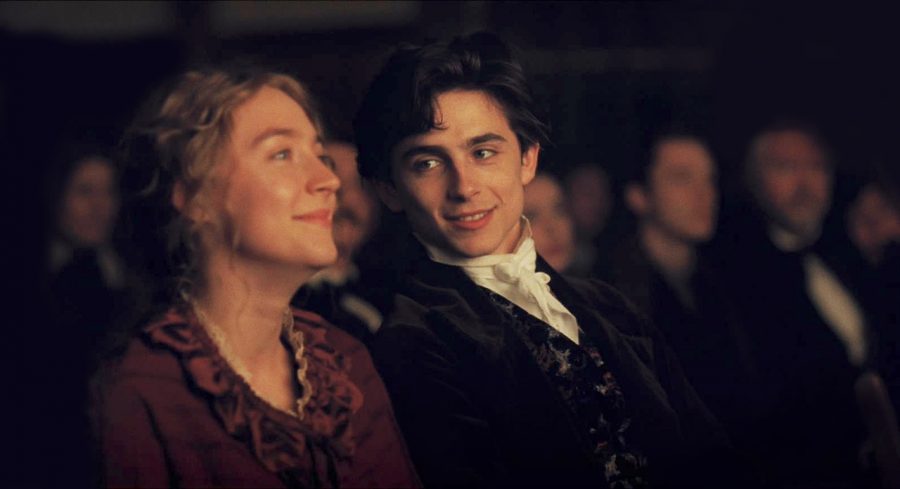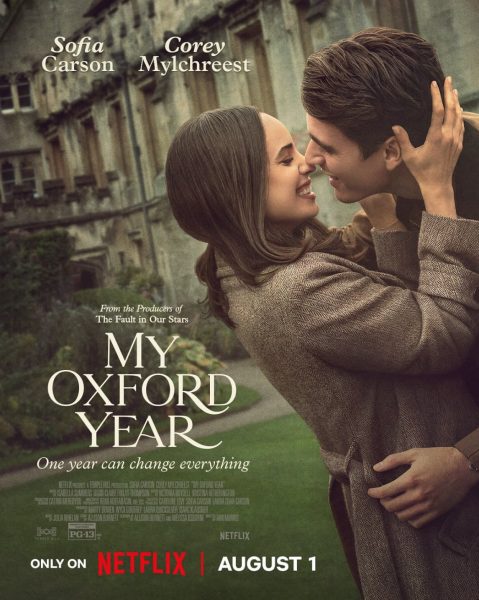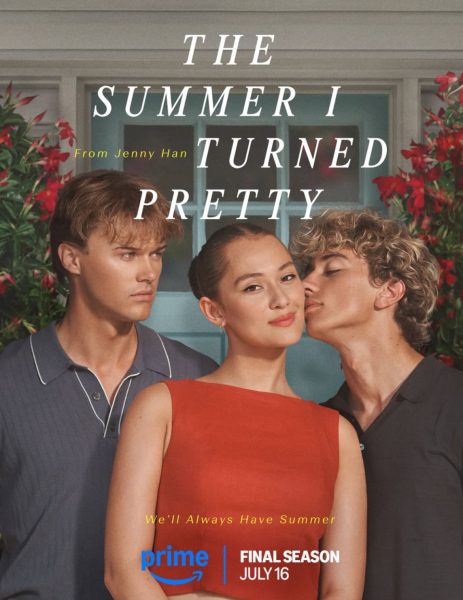Little Women Takes on the Big Screen Once Again
Greta Gerwig’s adaption of the beloved classic “Little Women” was released Christmas Day of 2019. Despite taking place in New England during the Civil War, the coming of age story of the four March sisters, Meg, Jo, Beth and Amy, has resonated with audiences throughout the 20th and now 21st century, being retold several times through television and film. Each version signifies what the director and writers find important at the time they adapt it. In the 1930s, “Little Women” stressed the importance of resilience during the Great Depression.
Almost 100 years later, the reboot represents the importance of a woman’s ambition. This powerful storyline is carried through by the star-studded cast: Meryl Streep as Aunt March, Saoirse Ronan as Jo, Emma Watson as Meg, Florence Pugh as Amy and Eliza Scanlon as Beth. Timothée Chalamet plays Laurie, a neighbor and friend of the sisters, and Laura Dern plays Marmee.
The film comes at a time when reboots seem to be an all-time peak in popularity. Gerwig makes “Little Women” her own by adding changes that do not alter the already well-known narrative but rather serve as necessary, meaningful updates. The film begins in medias res, with Jo living in New York City as an adult. She’s trying to make her way as a writer when Beth’s illness calls her back home to Concord, Massachusetts.
The story of Jo struggling to make it as a writer and support her family is artistically interwoven with the past, the story of the four girls growing up together. The past is filmed with a filter to create what the director calls a “golden glow,” signifying the young girls’ optimism regarding the future. The present is much duller, bare of the warm hues and hopes of youth as the sisters are faced with the reality Aunt March warned Jo about when she said, “No one makes their own way, least of all women. You’ll need to marry well.”
This way of filming also allows Gerwig to rework the way ambition was portrayed in earlier renditions, especially for Jo and Amy. Jo, who Alcott famously based on herself, spends the entirety of the novel rebelling against marriage and trying to find a way to support herself and her family, only to get married in the end. Gerwig understood that this was because Alcott could not have the heroine of her novel end as a spinster, as Jo’s editor in the 2019 film explains, because it was too much of a risk.
An unmarried woman in the late 1800s was unheard of, and her ambition would have been unnerving to the public. In light of this, Gerwig rewrites the end to pay tribute to the author, intercutting a scene of Jo speaking with her editor about having her novel, “Little Women,” published with Jo and the seemingly random love interest from the book, Professor Bhaer, getting married.
The end is deliberately unclear as to whether Jo actually marries or if she, like Alcott herself, remains unmarried but chooses marriage in her novel in order to get it published and more importantly, to maintain ownership of the copyright. While including the ending of the actual novel, the alternative interpretation pays tribute to Alcott: the intercutting of the couple is not real, but only imagined for the sake of Jo’s editor, and Jo ends as an independent and successful “spinster,” like Alcott.
Towards the end of the film, Jo cries out a line that perfectly captures the meaning behind this new ending: “Women, they have minds and they have souls, as well as just hearts. And they’ve got ambition, and they’ve got talent as well as just beauty, and I’m so sick of people saying that love is all a woman is fit for. I’m so sick of it.”
Gerwig also rewrites Amy, who is commonly regarded as the villain of the work. In an interview with SiriusXM, Florence Pugh says her portrayal of Amy under Gerwig gives the misunderstood character a “completely different image.” Her story of ambition differs from Jo, in that she is not trying to achieve independence through her work.
She understands that marriage is a necessity in a time when women had nothing and in many parts of the world were still treated as property. Amy aspires to marriage because she, as Pugh explains, is a realist. “It is the only guaranteed way of having their own income and having their own life, and something that Greta has given Amy in this version is that it is totally OK to be safe.”
The marriages in this film do not pretend to be romantic, and Amy makes clear in a scene with Laurie the necessity of such an institution when she says, “As a woman, there’s no way for me to make my own money…and if I had my own money, which I don’t, that money would belong to my husband the moment we got married … So don’t sit there and tell me that marriage isn’t an economic proposition, because it is. It may not be for you, but it most certainly is for me.”
Laura Dern speaks to the power of this new portrayal of Amy in an interview as well. “That’s what’s so incredible to see, Greta’s longing to make ambition this gorgeous and, in Amy’s character too, allow ambition to be fiery and gorgeous and not ‘Oh, no!’ like in a lot of films with female characters, because ambition in male characters is always honored.”
With this new Amy, Gerwig again brings to light the norms of the time the story is set in and highlights the different ways women had to work within these patriarchal institutions in order to survive.
By adding powerful updates to such a well-known work, the film has been well received by audiences and critics alike, earning six Oscar nominations, two Golden Globes and five BAFTAs. Despite this success, many felt that Gerwig was one of many female directors WHO were snubbed this Oscar season, as she did not receive an Oscar nominee for Best Director and only men were nominated.
This particular award is notoriously biased, as it is an accolade only five women have been nominated for, none of which were women of color, and only one woman has won in the 92-year history of the award. Even in the face of this snub, Gerwig’s tribute and the powerful portrayal from the cast successfully brought a new meaning to the beloved tale on the big screen.













































































































































































































